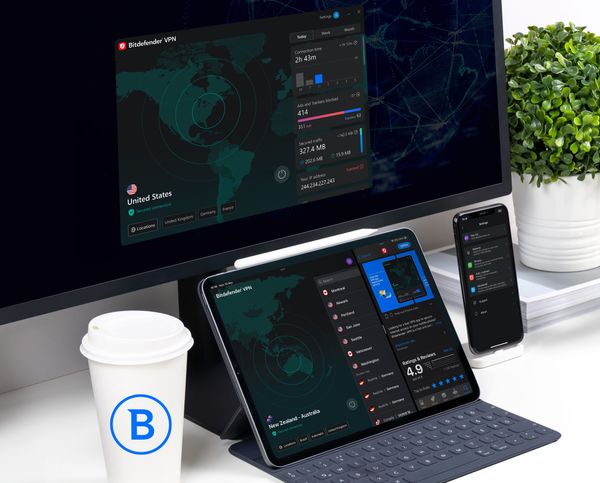How to Identify a Fake VPN

Until recently, privacy was associated with questionable or illegal activities, especially in the digital environment. However, net neutrality debates, online tracking, malicious actors and abusive surveillance habits have all played a role in making regular Internet users appreciate the need for privacy.
VPNs are among the most efficient online anonymity tools. Their popularity has triggered a surge in the number of services available, making it harder for consumers to choose a reliable provider to stick with.
The sudden increase in demand has also created a breeding ground for rogue services that would compromise the security and privacy of end users.
What are fake VPNs
As their name implies, fake VPNs are apps that masquerade as legitimate services to benefit their developers in various ways. They usually replicate genuine apps, which makes it harder for regular users to identify them.
Fake VPN developers are generally fueled by the same motive: money. Nevertheless, some services are specifically designed to infiltrate targeted systems and steal confidential data without raising suspicion.
Threat actors employ various marketing techniques to make rogue VPN apps seem appealing. They promise unmatched anonymity, zero logging, eye-watering speeds, and a plethora of advanced features. However, the strongest selling point of fake VPNs is that they are usually offered for free.
A fake VPN service can harm you in numerous ways, including by:
- Revealing your online identity
- Stealing your data and selling it to third parties
- Weaponizing your device to use it in a botnet
- Stealing your credentials and payment information
- Infecting your device with various strains of malware
- Exposing you to online threats
To make matters worse, fake VPNs carry out these malicious operations in the background, making it look as if they secure your connection and provide you with online anonymity. By the time users figure out the truth, the damage is done.
How to spot fake VPNs
Although there’s no bulletproof way to immediately spot a fake VPN app, a few things could tip you in the right direction.
Free VPN apps
Not all free VPN apps are malicious. However, the appeal of most fake VPN apps stems from the fact that they’re offered for free.
Although several legitimate VPNs are offered for free, they are quite clear about how they make money. Most display ads within the apps, while others resort to free trials or a combination of limited monthly bandwidth and referral bonus programs.
Fake VPN apps often advertise a completely free service with no ads and bandwidth limits. Since operating a VPN network can get quite expensive, free VPN apps that offer little to no insight into how they generate revenue should always be avoided.
The provider’s reputation
One thing to always look at when choosing your VPN is the company that owns it. Trustworthy VPN providers are less likely to get mixed up in shady, fake app operations.
If the company is just recently established and has no product other than the VPN app, it should immediately raise a red flag. This doesn’t mean that companies focusing solely on VPN development are suspicious.
You could always check if the company has been previously involved in security incidents or data mining scandals and notice how they managed the situation. Promptitude, transparency and a sense of responsibility are strong indicators of a high-quality service.
Ambiguous privacy policy
Legitimate VPN apps, such as Bitdefender VPN, offer customers straightforward service and privacy policies. Fake VPN apps are notorious for displaying vague policies in their apps or on their websites.
Most of the time, phony VPN apps use copy-pasted policy templates without bothering to adapt them to their service. In some cases, a glance at their policies can reveal severe inconsistencies that should be immediately treated as red flags.
Lack of contact details
Fake VPNs often lack contact details, making it impossible for end users to reach out to the alleged developers of the service. Users who do get in touch with the app’s developers often get automated replies, mostly worded in broken grammar.
Sometimes threat actors implement shortcomings intentionally in fake VPN apps to trick end users into contacting them. Once they get in touch, fake support agents could further deceive unsuspecting users into compromising their security and privacy.
Not working as they should
Cunning fake VPN app developers build their service to meet bare-minimum requirements to avoid raising suspicion. In other words, using a phony VPN app could sometimes feel like you’re using a legitimate service.
One of the essential features of a VPN is IP cloaking. Users might not bother looking any further if they notice that their VPN app can successfully hide their IP address.
In reality, there are several ways that a VPN can leak data from your connection. Properly testing a VPN service for leaks in a controlled environment (a virtual machine, a sandbox, a burner device) before installing it on your primary device could help you identify phony apps.
Fake VPN apps end up costing you more than well-established ones
All in all, the promise of online anonymity, geo-restriction bypassing and bandwidth throttling circumvention for free may sound appealing. However, it’s important to remember that fake VPNs always overpromise and underdeliver.
Whether they harvest your data and sell it to third parties, infect your device with malware, or expose your real identity to prying eyes, rogue VPNs will always cost you more than trustworthy services.
tags
Author

Vlad's love for technology and writing created rich soil for his interest in cybersecurity to sprout into a full-on passion. Before becoming a Security Analyst, he covered tech and security topics.
View all postsRight now Top posts
How to Protect Your WhatsApp from Hackers and Scammers – 8 Key Settings and Best Practices
April 03, 2025
Outpacing Cyberthreats: Bitdefender Together with Scuderia Ferrari HP in 2025
March 12, 2025
Streamjacking Scams On YouTube Leverage CS2 Pro Player Championships to Defraud Gamers
February 20, 2025
How to Identify and Protect Yourself from Gaming Laptop Scams
February 11, 2025
FOLLOW US ON SOCIAL MEDIA
You might also like
Bookmarks








